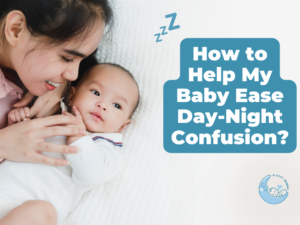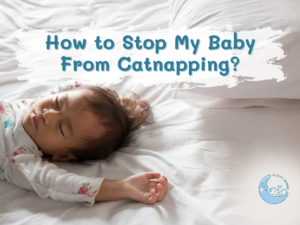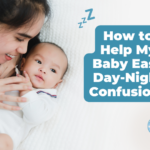Enquire Now with FREE 15 Mins Call
What Should My 3-Month-Old Baby’s Sleep Schedule Be Like?

Is your baby’s sleep pattern keeping you up at night? Wondering how to establish a healthy sleep routine for your 3-month-old? As your baby reaches the 3-month mark, you may notice significant changes in their sleep patterns and behaviors. At this age, their sleep cycles are maturing, transitioning from newborn sleep cycles to more adult-like sleep cycles. During this period, your baby’s sleep may become more disrupted, and they may experience more frequent night wakings. As a result, some parents might consider baby sleep consultations to help their baby sleep better. Let’s dive into creating a suitable sleep schedule for your little one and explore some essential tips for a better sleep experience.
1. Developmental Milestones
Developmental milestones are exciting to witness at this age. Your 3-month-old might start opening and closing their hands on purpose, showing improvement in vision, rolling from belly to back during tummy time, bearing weight on their legs when held upright, swiping at objects with their hands, making babbling noises, and smiling in response to interactions. Remember, milestones vary, and every baby is unique, so embrace your baby’s journey.
2. Activities
Engaging in activities that allow exploration is key at this stage. Spend time on the floor, read books, sing songs, and indulge in lots of tummy time with your baby. Independent play is also beneficial for their development, so let your baby explore during tummy time while you observe.
3. Sleep Cues
One essential aspect of a 3-month-old baby’s sleep schedule is recognizing their sleep cues. Pay attention to your baby’s behavior and body language, as these cues can indicate when they are ready for a nap or bedtime. Common sleep cues include rubbing their eyes, yawning, fussiness, or becoming quieter than usual. Being attuned to these cues can help you anticipate your baby’s sleep needs and ensure they are well-rested.
4. Total Hours of Sleep
A 3-month-old baby does best with no more than 5 hours of total daytime sleep and 10-12 hours of night sleep. Be mindful of wake windows and aim for bedtime no later than 8:00 pm.
5. Ideal Bedtime
When it comes to bedtime, most babies around 3 months old do best with a bedtime between 7:00-8:00 pm. However, every baby is different, and some may prefer a slightly later bedtime. Observe your baby’s behavior and adjust their bedtime accordingly to ensure they get the right amount of sleep they need.
6. Number of Naps
As for naps, your baby may take several short naps throughout the day and it can vary in duration. Be flexible with their nap schedule and aim for a total of about 3 naps during the day.
7. Nap Duration
The nap duration for a 3-month-old baby can vary, with some naps being inconsistent and short. While your baby may take a 2-hour nap in the morning, later in the day, they might take shorter naps lasting 20-40 minutes. Avoid letting any single nap go longer than 2 hours to ensure adequate awake time during the day and promote longer stretches of sleep at night.
8. Wake Window
The typical wake window for a 3-month-old ranges from 75 to 110 minutes. However, at 12 weeks, some babies may not be ready for the full 110 minutes, while by 16 weeks, 75 minutes may be too short first thing in the morning. Wake windows are generally shorter in the morning and longer before bedtime.
9. Night feeds
During the night, your baby may still need nighttime feedings. It’s common for babies at this age to wake up for feeds during the night. Respond to their hunger cues and provide comfort and nourishment as needed. As they grow older, they may naturally start to sleep for longer stretches without needing nighttime feeds.
10. Consistent Bedtime Routine
Creating a calming bedtime routine can significantly improve your baby’s sleep quality. Incorporate soothing activities like a warm bath, gentle massage, reading a bedtime story, or singing a lullaby. A consistent routine signals to your baby that it’s time to wind down and prepare for sleep.
11. Sleep Regressions
Regarding sleep regression, while the infamous 4-month sleep regression can start as early as three months, it is important to remember that babies may experience changes in sleep patterns during developmental milestones.
12. Building Good Sleep Habits

Laying a healthy sleep foundation for your baby and helping them fall asleep independently is crucial. Sleep training isn’t developmentally appropriate at this age, but you can work towards establishing good sleep habits to support longer stretches of sleep at night. Help your baby learn to fall asleep independently by placing them in their crib while drowsy but still awake. This helps them associate their sleep space with relaxation and sleep. Avoid relying on sleep props, such as rocking or nursing to sleep, as it may create sleep associations that are difficult to break later on. If you’re struggling with your baby’s sleep and need personalized guidance, consider baby sleep consultations provided by a certified baby sleep consultant. A baby sleep consultant can understand your baby’s sleep patterns and conduct a 0-3 months sleep pattern evaluation. She can also offer expert advice, and provide a tailored sleep plan that suits your family’s needs. At Sleepy Bubba, we offer baby sleep consultations to help parents navigate the challenges of sleep and establish healthy sleep habits. If you need more help, just book a FREE 20-minute discovery call with us to discuss your baby’s sleep and find solutions to ensure better sleep for both you and your little one.
Conclusion
In conclusion, understanding and addressing your 3-month-old baby’s sleep schedule is essential for their overall well-being and development. At this stage, babies go through significant changes in their sleep patterns and may experience sleep regressions. By being attuned to your baby’s sleep cues, establishing a consistent sleep routine, and providing a comforting sleep environment, you can help them navigate through these transitions more smoothly. While formal sleep training is not recommended for babies under 4 months old, fostering healthy sleep habits and encouraging independent sleep can set the foundation for better sleep in the future. If you find yourself facing challenges with your baby’s sleep, don’t hesitate to seek guidance from a baby sleep consultant. With expert advice and personalized support, you can ensure that both you and your baby get the rest you need to thrive. Remember, every baby is unique, and with patience and love, you can create a peaceful and restful sleep environment for your little one.







